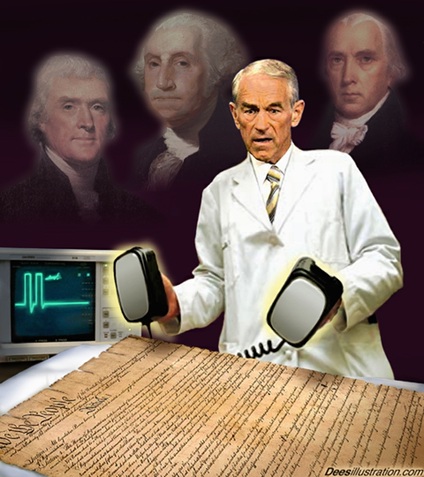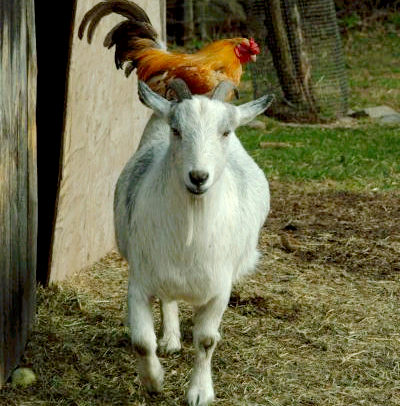Last Sunday, U.S. Republican presidential candidate and raw-milk darling Ron Paul, set a new record for a presidential candidate in either party, hauling in more than $6 million online.
 In the new New Republic, msnbc host Tucker Carlson, in the appropriately titled, On the road with Ron Paul’s merry band of misfits and his hooker fan club, writes,
In the new New Republic, msnbc host Tucker Carlson, in the appropriately titled, On the road with Ron Paul’s merry band of misfits and his hooker fan club, writes,
"that Paul, who is small and delicate and has a high voice, spoke in a near monotone, making no effort to excite the audience. They cheered anyway. Then he said this: ‘The Constitution gives no authority for a central bank.’
"The crowd went wild, or as wild as a group of sober Republicans can on a Monday night. They hooted and yelled and stomped their feet. Paul stopped speaking for a moment, his words drowned out. Then he continued on about monetary policy.
"Paul never outshines his message, which is unchanging: Let adults make their own choices; liberty works. For a unified theory of everything, it’s pretty simple. And Paul sincerely believes it.
"Most Republicans, of course, profess to believe it too. But only Paul has introduced a bill to legalize unpasteurized milk. Give yourself five minutes and see if you can think of a more countercultural idea than that. Most people assume that the whole reason we have a government is to make sure the milk gets pasteurized. It takes some stones to argue otherwise, especially if nobody’s paying you to do it. (The raw-milk lobby basically consists of about eight goat- cheese enthusiasts in Manhattan, and possibly the Amish.)
"Paul is pro-choice on pasteurization entirely for reasons of principle. ‘I support the right of people to drink whatever they want," he says. He mocks the idea that "only government can make sure we’re safe, so we need the government to protect us. I don’t think we’d all die of unsafe food if we didn’t have the FDA. Someone else would do it.’"
Hey, I’m all for libertarianism. But what about the kids that get sick?
From 1998 to 2005, a total of 45 outbreaks of foodborne illness were reported to CDC in which unpasteurized milk (or cheese suspected to have been made from unpasteurized milk) was implicated. These outbreaks accounted for 1,007 illnesses, 104 hospitalizations, and two deaths.
Because not all cases of foodborne illness are recognized and reported, the actual number of illnesses associated with unpasteurized milk likely is greater.
A table of the outbreaks is available at http://www.foodsafety.ksu.edu/articles/1138/RawMilkOutbreakTable.pdf
Yes, lots of foods make people sick. And people should be free to choose what they ingest.
The 19th century English utilitarian philosopher, John Stuart Mill, noted that choice has limits, stating, "if it [in this case the consumption of raw unpasteurized milk] only directly affects the person undertaking the action, then society has no right to intervene, even if it feels the actor is harming himself."
Excused from Mill’s libertarian principle are those people who are incapable of self-government – children.
Science can be used to enhance what nature provided. Further, society has a responsibility to the many — philosopher Mill also articulated how the needs of the many outweighed the needs of the one — to use knowledge to minimize harm.
Adults, do whatever you think works to ensure a natural and healthy lifestyle, but please, don’t impose your dietary regimes on those incapable of protecting themselves: your kids.
And support the International Food Safety Network.
Give large. Give small. It’s all on-line at
https://one.found.ksu.edu/ccon/new_gift.do?action=newGift&CCN_FUND_ID=3894&SCENARIO=SELECTFUND
Any problems, just e-mail me, dpowell@ksu.edu.
And if you benefit from our services, then we’re continuing with our payment model that alt.music darlings Radiohead stole from us: pay what you want. If there’s that much money for Ron Paul, there’s some for safe food.

 In the
In the  It seems like every week in the U.S. there is a report of unpasteurized milk testing positive for listeria or salmonella or E. coli or campylobacter or some other dangerous bug; every month there is a report of people, largely children, sickened after consuming unpasteurized milk.
It seems like every week in the U.S. there is a report of unpasteurized milk testing positive for listeria or salmonella or E. coli or campylobacter or some other dangerous bug; every month there is a report of people, largely children, sickened after consuming unpasteurized milk.
 The
The